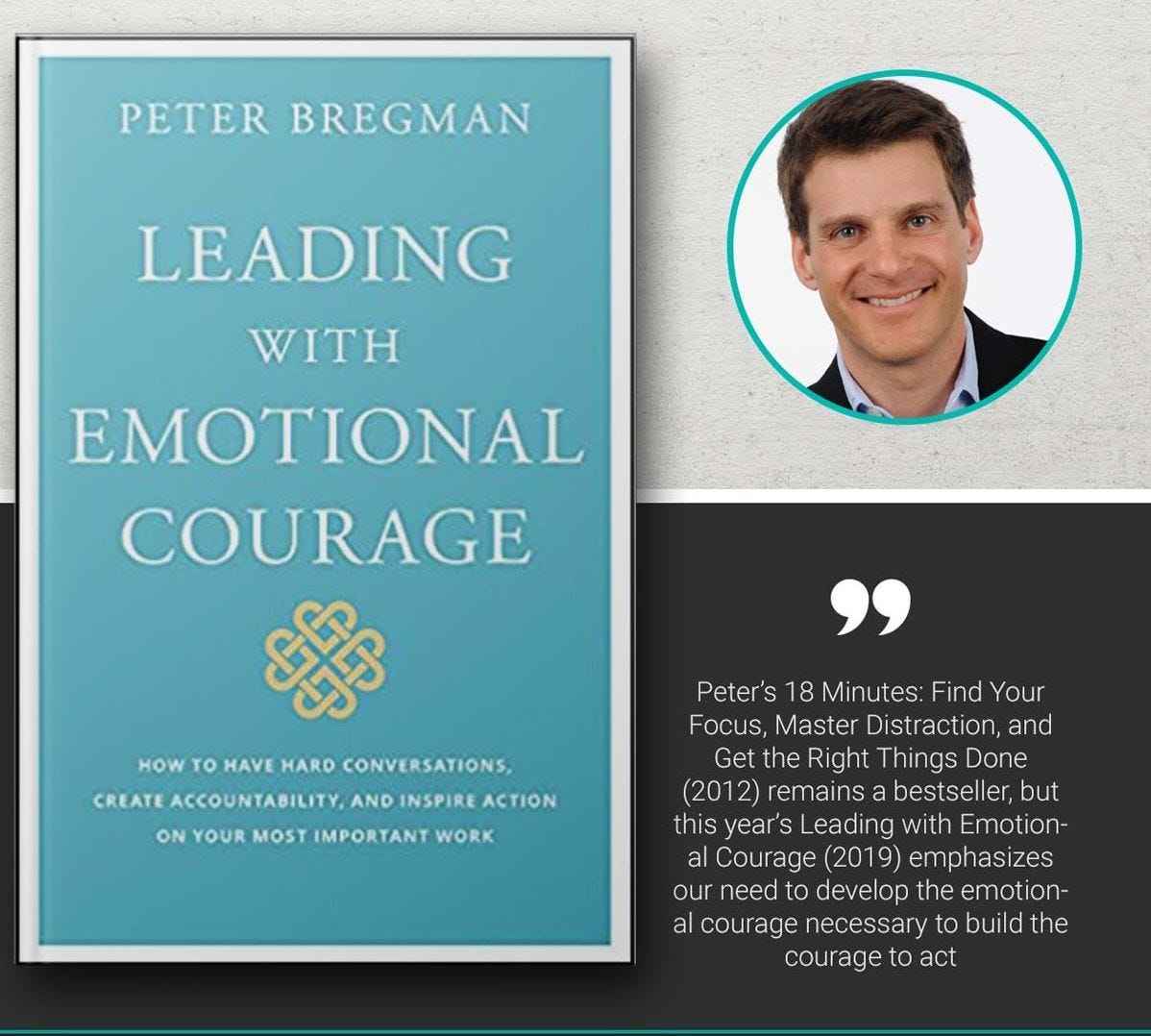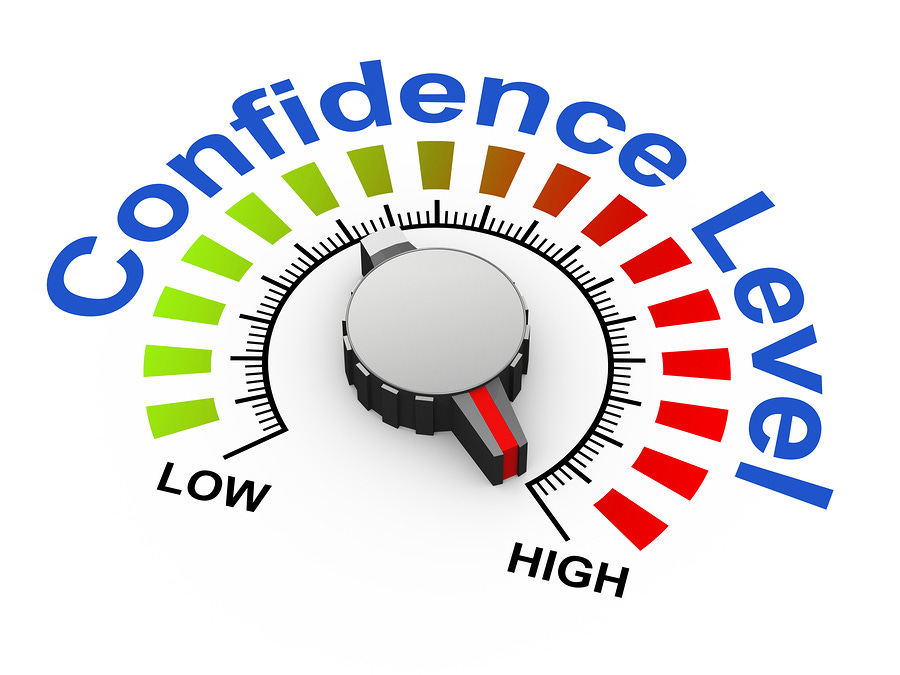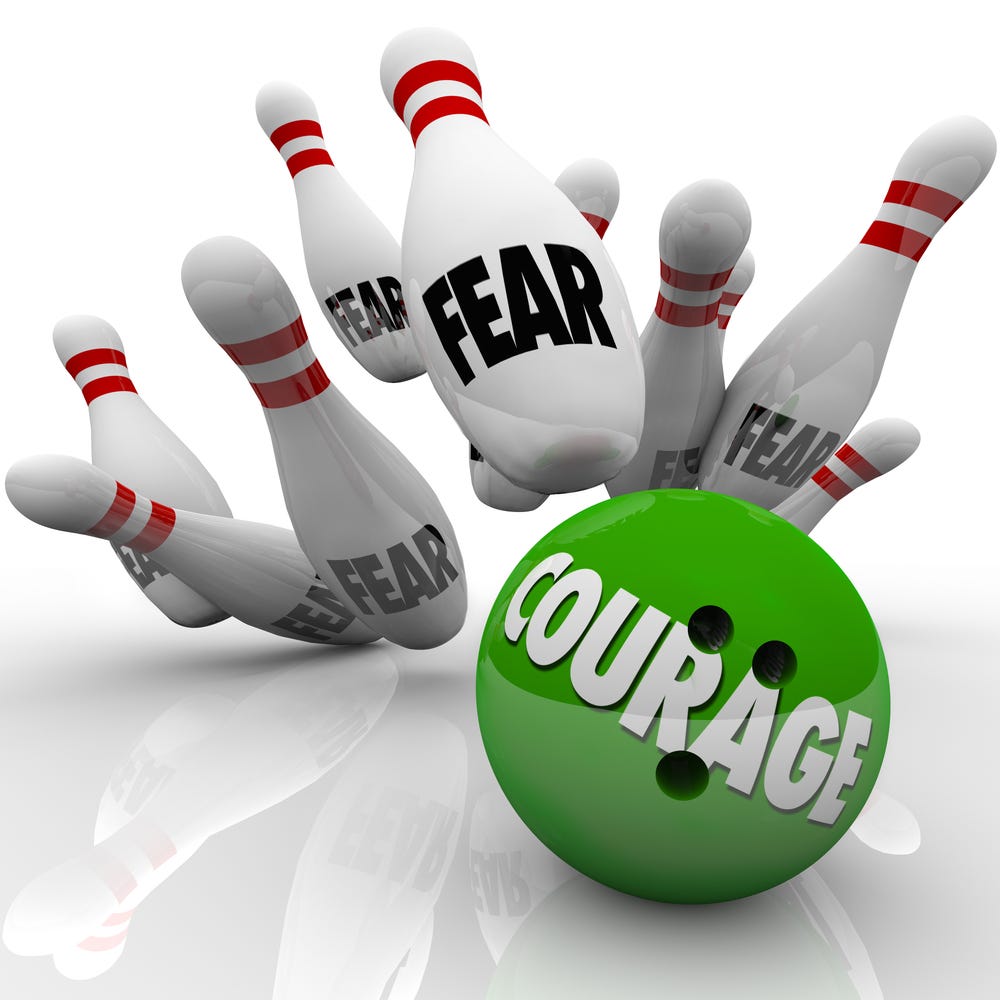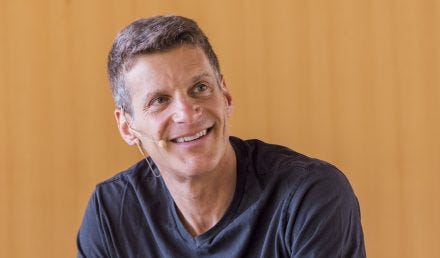GREAT LEADERS ARE CONFIDENT, CONNECTED, COMMITTED, AND COURAGEOUS
(c) Pat LaCroix/ Getty Images
Brad was leading a difficult turnaround of his company and had decided to fire his Head of Sales, who was a nice guy but wasn’t performing. Three months later, he still hadn’t fired him. I asked him why. His answer? “I’m a wimp!”
Brad (not his real name - I’ve changed some details to protect people’s privacy) is the CEO of a financial services firm and is most definitely not a wimp. He’s a normal human, just like you and me. And he’s struggling to follow through on an important, strategic decision. Just like, at times, you and I do. No matter your age, your role, your position, your title, your profession, or your status, to get your most important work done, you have to have hard conversations, create accountability, and inspire action.
In order to do that, you need to show up powerfully and magnetically in a way that attracts people to trust you, follow you, and commit to putting 100% of their effort into a larger purpose, something bigger than all of you. You need to care about others and connect with them in such a way that they feel your care. You need to speak persuasively - in a way that’s clear, direct, and honest and that reflects your care - while listening with openness, compassion, and love. Even when being challenged. And, of course, you need to follow through quickly and effectively.
(c) Pinterest
In 25 years of working with leaders to do all the above, I have found a pattern that I share in my new book, Leading with Emotional Courage, consisting of four essential elements that all great leaders rely on to rally people to accomplish what’s important to them. To lead effectively - really, to live effectively - you must be confident in yourself, connected to others, committed to purpose, and emotionally courageous.
Most of us are great at only one of the four. Maybe two. But to be a powerful presence - to inspire action - you need to excel at all four simultaneously. If you’re confident in yourself but disconnected from others, everything will be about you and you’ll alienate the people around you. If you’re connected to others but lack confidence in yourself, you will betray your own needs and perspectives in order to please everyone else. If you’re not committed to a purpose, something bigger than yourself and others, you’ll flounder, losing the respect of those around you as you act aimlessly, failing to make an impact on what matters most. And if you fail to act powerfully, decisively, and boldly - with emotional courage - your ideas will remain idle thoughts and your goals will remain unfulfilled fantasies.
Let’s apply this to Brad and identify precisely where and how he was getting stuck.
Confident in yourself.
(c) Thrive Global
Brad struggled with this element, which might feel surprising since he was so successful in his career. But this is not uncommon. He worked tremendously hard, but it came from some degree of insecurity - he wanted to prove himself and please those around him. He became unnerved in the face of potential failure and was not particularly gentle or compassionate with himself when he did fail. He did have important strengths in this element: He saw the person he wanted to become and he worked toward that future, putting aside distractions and investing his energy wisely and strategically.
Connected to others.
(c) Inc. Magazine
This was Brad’s greatest strength. He was well-loved and always took great care of his team. People clearly knew and felt that he trusted them, even when he disagreed with them. They appreciated his curiosity - about people and problems - and were grateful that he did not draw quick conclusions about them. All that said, even in this element, he had room to grow: He was not always direct with people and tended to procrastinate on difficult conversations.
Committed to purpose.
(c) ze.tt
This was a mixed element for Brad. On the one hand, Brad was clear about what needed to get done to grow the firm, he engaged people in the early stages of work, and he was open and willing to ask for help. On the other hand, he was somewhat scattered. He wasn’t clear enough about the small number of things that would move the needle, and he didn’t have a reliable process for staying focused on the most important things, ensuring accountability and driving follow-through. Not firing his Head of Sales sent a mixed message to his team - was he really serious about the firm’s success?
Emotionally courageous.
(c) medexec.org
Brad had room to grow here, and it turned out to be an important element for growing his strength in the other three elements. Risks, by definition, make us feel vulnerable, and Brad avoided that feeling. He resisted the unknown and intentionally avoided uncomfortable situations. This made it hard for him to tell people hard truths and make hard decisions quickly, which stalled his actions.
So, Brad’s strongest element was “connected to others,” followed by “committed to purpose.” He was weaker in “confident in yourself” and “emotionally courageous.”
Which puts his challenge in perspective: His connection to his head of sales was at war with his commitment to the success of his team and company. Meanwhile, his confidence in himself and his emotional courage weren’t strong enough to break the tie. That’s a recipe for inaction and painful frustration.
Just knowing what was happening helped him immediately. We spent some time strengthening his emotional courage by taking small risks while feeling the emotions he had been trying to keep at bay. Each time he followed through, regardless of whether he succeeded, he obviously survived and also felt the accomplishment of addressing the risk itself. Which, of course, built his confidence. Which helped him take bigger risks.
In a short time, he felt prepared (even though he may never have felt “ready”) to follow through on what he had known he needed to do for the past three months. With his natural care, compassion, and humanity, he fired his Head of Sales (who, by the way, and unsurprisingly, knew it was coming and said he felt “relieved”).
Brad was extremely uncomfortable going into the conversation - that’s almost always the feeling you’ll have when you do anything that requires emotional courage.
But using emotional courage builds your emotional courage. Brad emerged from the conversation stronger in all four elements: He was more confident in himself, more connected to his team (and even, believe it or not, his Head of Sales), more committed to purpose, and more emotionally courageous.
Author’s Note: Curious about how you stack up? I’ve created an assessment on my website that will help you identify strengths and weaknesses in each of the four elements. Once you take it, you will have a good idea of where you have room to grow. It’s free to take. You’ll have to submit your email address, but we’ll only include you on our mailing list if you ask us to.
SUMMARY
(c) Lisa Earle MacLeod
Great leaders demonstrate four elements to inspire action: They are confident in themselves, connected to others, committed to purpose, and emotionally courageous. Most of us are great at only one of the four. Maybe two. But to be a powerful presence, you need to excel at all four simultaneously. If you’re confident in yourself but disconnected from others, everything will be about you and you’ll alienate the people around you. If you’re connected to others but lack confidence in yourself, you will betray your own needs and perspectives in order to please everyone else. If you’re not committed to a purpose, something bigger than yourself and others, you’ll flounder, losing the respect of those around you as you act aimlessly. And if you fail to act powerfully, decisively, and boldly - with emotional courage - your ideas will remain idle thoughts and your goals will remain unfulfilled fantasies.
ABOUT THE AUTHOR
Peter Bregman is the CEO of Bregman Partners, a company that helps successful people become better leaders, create more effective teams, and inspire their organizations to produce great results. Best-selling author of 18 Minutes, his most recent book is Leading with Emotional Courage. He is also the host of the Bregman Leadership Podcast.
© www.hbr.org
NB: Information on joju.substack.com is mostly adapted or culled from press releases or supporting affiliates’ contents and are thus copyright materials. These are not in any way the personal thought, opinion or view of the Publisher.












